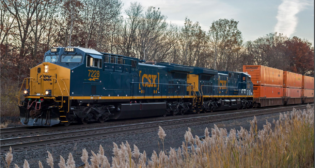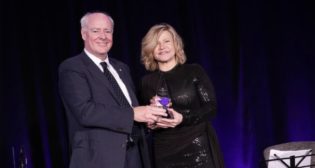
Matt Rose and Warren Buffett: Managing the business
Written by AdministratorAccording to information in BNSF's 10Q quarterly filing at the Securities and Exchange Commission, the company paid a dividend of $250 million to Warren Buffett, its only stockholder. Some analysts immediately raised questions about the wisdom and size of the dividend payment.
Considering that the dividend was consistent with amounts BNSF paid to its shareholders when it still was a public company, and that no investor or would-be investor can acquire BNSF stock, the dividend it pays to its owner really should be of no concern to the public.
The Surface Transportation Board has the responsibility and authority to ensure that BNSF continues to provide quality rail service to its customers, and there is no suggestion that it either is not doing so or that it does not have the ability to do so. What is of concern is how BNSF is being managed now that it is a wholly-owned subsidiary of Berkshire Hathaway. On that count, the answer appears to be “pretty well,” perhaps even “very well.”
The $603 million in net income in the second quarter was a record. This is not too surprising, as all of the major railroads reported earnings that beat analyst estimates. They not only beat estimates, they managed to bring their ratio of operating expenses to revenue down to record levels. A low operating ratio is significant because it means a railroad has more of each dollar of revenue available for capital spending and coverage of debt payments.
Businesses in all industries seek to generate free cash flow, money that exceeds operating expenses and any amounts obligated to pay down debt and fund capital spending. FCF, as analysts call it, can be used to pay dividends, fund and support capital spending programs, and buy back stock—a way of returning money to investors by shrinking the base of stock outstanding and presumably increasing the value of each share.
BNSF is paying to its sole stockholder a dividend that is identical to what it paid when it had several hundred million shares outstanding. The railroad is continuing its capital spending program, and it obviously isn’t buying back shares as there are none in public hands to be bought.
Matt Rose has talked over the years about “buckets” in capital spending. When he first became CEO, he referred to a catch-up bucket because the former Burlington Northern Railroad had been under-invested, particularly in locomotive purchases, for a number of years. The maintenance bucket was the capital that had to be spent to keep the railroad’s property functioning in good order, and the expansion bucket represented spending that would increase the railroad’s capacity and ability to provide better service.
There is little choice in funding the first two buckets; rail service can deteriorate quickly if management does not spend the money required to serve its markets. The expansion bucket can be shorted when money is tight, but eventually that catches up as the railroad would be unable to serve the needs of a growing economy and population.
When Buffett agreed to buy BNSF, he expressed the view that railroads have a bright future, even commenting that he was a slow learner for having taken so long to appreciate the value of owning a railroad. Buffett’s track record over the many years that he has run Berkshire Hathaway is that of a long-term investor, not a trader. His avoids acquiring troubled companies and retains the existing management. No micro-manager, his reputation is that of an owner who hires good executives and lets them run the business the way they believe it should be managed.
Rose is the second CEO of BNSF, having succeeded Robert D. Krebs, the first CEO after the 1995 merger of the former Santa Fe and Burlington Northern railroads. BNSF has performed well under Rose and the railroad is the industry leader in coal, intermodal, and grain shipments.
Investors have no reason to be interested in BNSF, but other stakeholders have a very legitimate interest. This includes shippers, communities where the railroad has a concentration of operations and employees, public officials, and employees. The only real change from public ownership is that neither Buffett nor Rose has to listen to questions about dividend policy.



